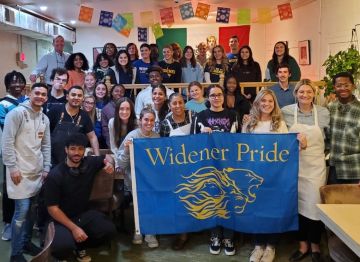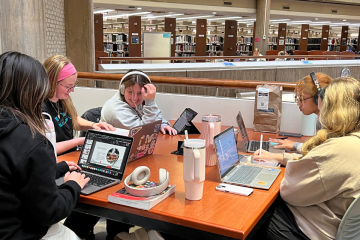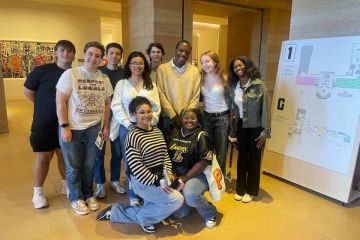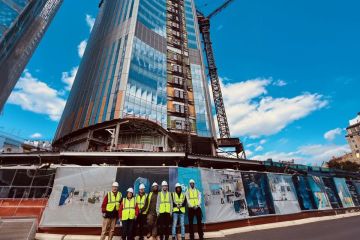ASC 101 Sheds New Light on Personal Experiences

Widener’s College of Arts and Sciences recently launched a new approach to general education courses in the ASC 101: Thinking Through series of classes required for all students. Unlike traditional general education courses, each ASC 101 course explores a question that does not have a straightforward answer.
Topics range from art and culture, to food, to heroes and villains, and more. Students navigate the topic with professors and peers through discussion, research, and hands-on experiences such as guest lectures and field trips.
While reading through the topics of ASC 101 classes, I became interested in the section “Know no Limits: Borders” because of my background in a country with a long migration history. My main interest was to learn about this topic within an academic setting, separate from my previous personal experiences with it. This class asked the question “what if we lived in a world without borders?”
Growing up in Albania, a small country in the Balkans, meant witnessing numerous family members leave the country in search of better opportunities. Many of them left Albania in overcrowded boats, seeking a chance at a more stable life in other European countries.
All these personal experiences connected with the content of this ASC 101 class allowing me to learn about other countries with significant migration numbers, better understand migration policies, and hear from individuals who had personally undergone the migration journey.
One of these individuals was Chef Cristina Martinez, whom I initially discovered in the ASC class while watching her featured in the Netflix series "Chef's Table.” In the series, she shared various moments of her life from the decision to cross borders from Mexico to the United States to eventually establishing her own restaurant, “Casa Mexico.” After the series, our professor, Chelsea Abbas, mentioned that we could actually visit Chef Martinez's restaurant, and although it seemed unbelievable at first, we ended up going.
That evening in the restaurant stays vivid in my mind, as I listened to Chef Martinez speak openly about the various challenges she faced. That wasn’t just a moment of inspiration of how far she had gone, but also connection, realizing how profoundly I could relate to her story. As she was sharing her stories, she was also teaching everyone a lesson on cooking tortillas. It was the authentic method from her home country’s tradition that added a special touch to her tortillas, and other dishes. Specifically, it is these traditions that play a key role in maintaining one's identity, no matter the country in which they have chosen to live. They all contribute to the genuine meaning of cultural diversity, something so important for the world nowadays.
Among all the courses I took in my first semester at Widener, the ASC 101 class held a unique place as it focused on a topic close to my heart. It was more than just another academic course; it resonated with my personal experiences.
One of the most rewarding aspects of the class was discovering that classmates who hadn't lived under migrant status were so open to learning more about migrants and borders. In my case, migration meant leaving what was easy and familiar to me, in search of better opportunities that challenged me and presented options I wouldn’t encounter in Albania. America, being the land of opportunity, was always on my radar.
I never imagined that at just 17 I would find myself miles away from the place I call home, trying to build a sense of belonging in a completely different society. Everything was different, from the American schooling system I attended to the food I had to get used to.
Despite having studied English in my country, nothing quite prepared me for the feeling that came over me when people began speaking directly to me in the United States. The speed at which people communicated presented a challenge beyond what I had learned in a classroom setting. It wasn't until I came to the United States by myself that I truly grasped the essence of migration.
Growing up in a family that had migrated to Italy and other parts of Europe, I thought I knew what to expect, but the real feeling of navigating a foreign land hit me when I was alone and had to put myself out in a whole other culture. From cultural adjustments and homesickness to facing stereotypes and the constant need to prove myself in a new environment, this experience opened my eyes to something completely new, and it surprised me how many of my classmates were so open to learning about it. This class brought to light a broader understanding and empathy, creating a space where diverse perspectives were not only acknowledged but embraced.




